Dodging Wrecking Ball, Building Will Be Enlarged And Reshaped; Will The Remodel Preserve A Picture Of Denver’s Movie Theatre Past?
by Glen Richardson
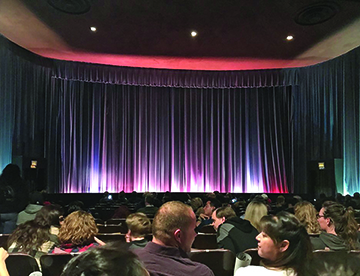
The Last Picture Show: As times changed, along with tastes in entertainment, theatre building will be turned into restaurant, retail, and office space.
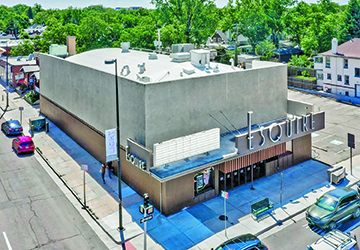
Swapping Size, Shape: The Esquire Theatre building will be enlarged and reconfigured. Landmark Preservation Commission must approve building’s reconstruction.
Are you ready to feel a little down, despondent, and dejected? Flicks are being flicked off at Cap Hill’s historic Esquire Theatre. Lessee Landmark Theatres reopened the site last June following water damage declaring, “We’re back… and better than ever!” The lease expires in July of this year (2024), evidently without a renewal option.
The building was purchased by Sam Leger and Tim Finholm of South Broadway-based Unique Properties for $2.1 million in 2021. At the time of purchase, Finholm implied that “what happens with the property will depend on whether Landmark wants to stay.” It’s unclear, however, if shuttering the theatre was Landmark’s choice or a joint decision. Regardless, Unique Properties CEO Leger and Executive VP Finholm are listed on the building’s application for conversion.
Nestled on the corner of 6th Ave. and Downing St., the cinema has long been a neighborhood and Capitol Hill staple. Since opening in the fall of 1927 as the single-screen Hiawatha Theatre, the Esquire expanded and withstood the test of time. It has been leased to Landmark since 1980. Landmark also operates Denver’s Mayan, Chez Artiste, and Landmark Greenwood Village theatres. Once controlled by billionaire Mark Cuban, the theater chain sold to Cohen Media Group in 2018.
Shock, Sadness
The tucked-away Downing St location made the Esquire uniquely popular and a Mile High City cultural icon. In a city that once boasted as many as 66 movie theaters, it has long been known as one of Denver’s historic movie palaces.
Within hours followin
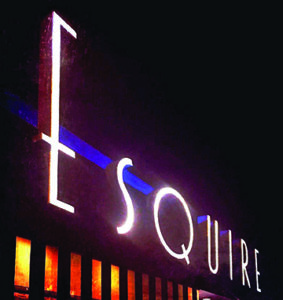
Sign Signals Switch: Plans suggest the Esquire Theatre marquee sign will remain on the remodeled structure as homage to the theatre and building’s history.
g the closure announcement Cap Hill residents and Esquire admirers took to social media to express their shock, sadness, and dismay: “I will be so heartbroken if we lose this. The Esquire is such an important part of Denver, of the film culture here.” Further, added another: “I know change is inevitable, but I wonder what will fill the void of these type of micro-communities that existed in the real, non-internet, world.”
Others summed up loss of the irreplaceable experience thusly: “It’s so sad watching so much of Denver die one piece at a time. Let’s just murder everything about Denver that was cool and make us a cookie cutter, mixed-use city.”
Building To Stay
The two-story building that housed the Esquire, however, will endure. The site will be enlarged and reshaped into a mix of restaurant, retail, and office space. Denver’s Landmark Preservation Commission must approve reconstruction of the building. If it is approved, the project is expected to start this June and be completed by January 2025.
The public became aware of the theatre closing at the end of last October when Denver’s Department of Community Planning & Development received redevelopment plans for the theater property.
Those plans, submitted by Michael Noda — a partner at architectural firm Neo Studio located on Walnut St. in Denver — call for increasing the two-story, 9,175-sq.-ft. theater building by more than a 6,000-sq.-ft. An addition on the south end of the building would stretch the structure into the parking lot.
Change, Sign Stays
If approved, the building is expected to total 15,800-sq.-ft. on the property’s 0.39-acre lot. Documents indicate the first floor will be divided into two 3,675-sq.-ft. units, one for retail, the other a restaurant space. The upstairs would be turned into office suites.
Plans for the building’s renewal include the addition of several small structure components. Site plans indicate new entrances will be constructed on the no
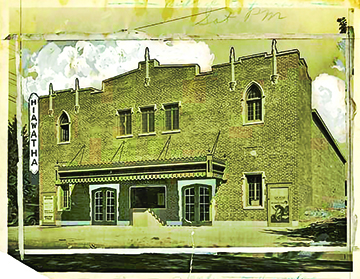
Historic Hiawatha: Photograph of the Esquire building at the 1927 grand opening as the Hiawatha Theatre. Winners of the Wilderness was showing on the single-screen.
rth and south sides of the building. More: Skylights will be installed on the roof, plus awnings added on the north side of the building.
One thing, however, will apparently remain the same. Plans indicate the current Esquire signage will remain as homage to the theatre and building’s history.
Poignant Predictions
Can the Esquire building recover from a remodel? Repurposing of existing buildings is a newsworthy issue, particularly with Denver’s rich architectural heritage.
“Architecture is not really about buildings, any more than poetry is about vowels,” is how award-winning architect Sam Rodell explains the emotions associated with buildings.
Denver’s Esquire enthusiasts relate to Rodell’s emotional building claim, and share their thoughts about the proposed remake of the movie palace building: “It
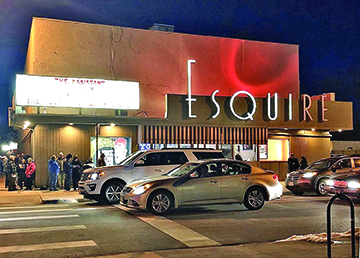
Going, Going, Gone: Movies at the Esquire Theatre have been good to the end, but functional and technical obsolescence will turn the building dark this year.
would have been good to end up with a theater use and the parking lot redeveloped with a new restaurant and housing. But two-screen theaters are clearly not profitable, especially with the Mayan so close showing the same kind of program. Admits another, “Having an active street front rather than a blank wall on 6th Ave. will help the area feel more like a neighborhood.”
Conversion Countdown
The Esquire building is a connection between the past and present, and a way to preserve local memory and culture. It was a space where we created memories of time spent with family and friends in the dark watching films that are no longer with us. The structure was a witness to another age and hopefully will become a living example of Denver’s movie theatre past.
So as not to lose the memory of what came before, Neo Studio — the architectural firm remodeling the Esquire building — is being called upon to adapt the existing building to meet new needs. It will require a great deal of creative effort, and local feedback since the project involves changing the entire function of the building.
As with any renovation, uncertainty, surprises, and last-minute changes are possible if not probable. Capitol Hill and Denver residents, plus Esquire fans and movie buffs are holding their breath, waiting anxiously and excitedly to see what materializes.
Esquire Draws Signatures; Owners Reapply For Remodel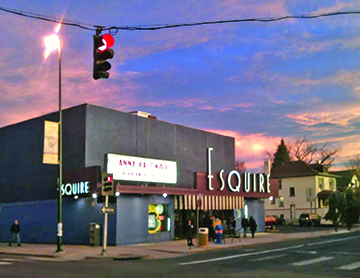
An online petition had collected more than 2,500 signatures to save the Esquire Theatre by early December @savethe esquire. Seeking to stop site redevelopment, the group hopes the theatre will be designated a historic landmark.
Denver’s Community Planning & Development disclosed in December that they were awaiting resubmittal of the plans due “to issues” with the original proposal. When questioned about plans to stretch construction into the parking lot, owners retorted: “We don’t have plans to do anything to anything at the moment. We just made a submittal.”
Should the theatre get a landmark designation, the Landmark Preservation staff opinion is that, “the theatre could still be developed for uses other than a theater.”
